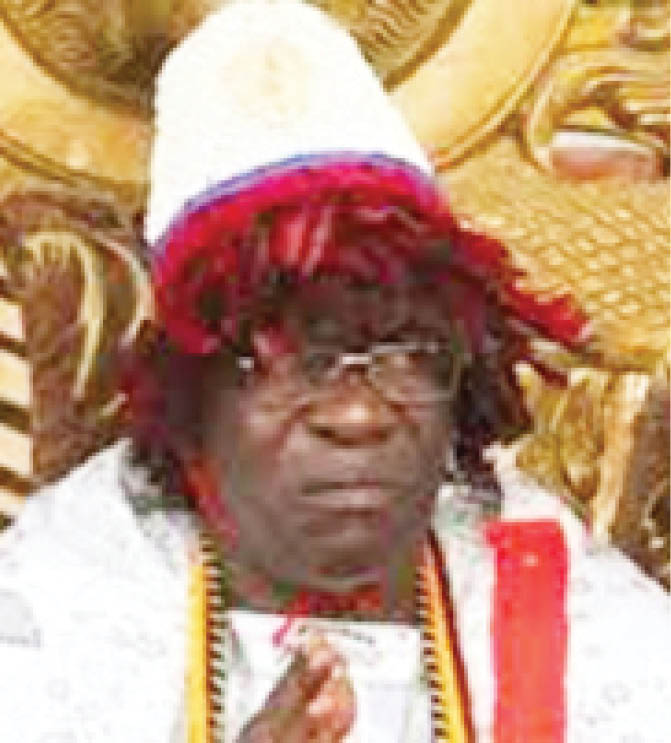The passage of Idakwo Michael Ameh Oboni II on August 27, 2020 in an Abuja hospital following a brief illness marked the beginning of succession struggle to the exalted throne.
He was 72 and served the kingdom for seven years before joining his ancestors.
- How Boko Haram survives on weapons stolen from Nigerian military
- Malaria still killing Nigerians in droves
The vacuum created by the demise of the prominent paramount ruler, who was the president of the Kogi State Council of Chiefs, is yet to be filled.
His predecessor, Alhaji Aliyu Obaje, ruled the Igala kingdom for 56 years and was considered the longest serving monarch in Igala history.
Following his death, floodgates of aspirations were opened ajar for would-be contestants for the exalted royal seat.
This is not surprising as antecedents of ascending the throne have shown over the years.
The Attah Igala’s stool is to be rotated among four ruling houses of the Ayegba Oma Idoko bloodline in the order of seniority – Aj’Ameacho, Aj’Aku, Aj’Akogu and Aj’Ocholi. In this vein, after the reign of one family, the next to assume the throne is usually known.
Again, in each family, there’s a preference for the eldest prince among the sons of the last person to occupy the stool, granted that he is screened and considered qualified, and then presented by the ruling house where he belongs as their choice.
However, the emergence of the longest serving Attah, Alhaji Aliyu Obaje, was said to have breached the laid down procedures and traditions of Igala land. He was said to have been imposed on the Igala kingdom as the paramount ruler in 1956 by the British colonial government in the country at the time.
His emergence was at the expense of the Opaluwa Oguche (from the Aju-Ameacho bloodline), the eldest son of Oguche Akpa, the then Attah Igala that reigned between 1911 and 1919.
Obaje did not observe the rituals associated with ascendancy to the throne as he was merely imposed on Igala people by the powers that be without recourse to processes and traditions. He emerged from a different ruling house other than the one next in line at the time.
Prince Samuel Opaluwa Oguche from the bloodline of Aju-Ameacho, the most senior of the four ruling clans as the Attah designate was only waiting to be installed after he had observed all the ritual protocol before the ‘royal coup’ plotted by the then British government who brought in Obaje instead.
The British preference for Obaje was said to be on the ground that he was educated, as against the qualified candidate from the Opaluwa Oguche’s bloodline.
The development was a bitter pill for Igala kingdom to swallow in the face of an enduring tradition that was laced with revered procedures, which were discountenanced by the British overlords.
It set spanner in the wheels of the selection process and paved way for contentions and acrimony among contestants in a hitherto peaceful ascension process that was essentially democratic in all ramifications.
The kingmakers kicked against the aberration, albeit, fruitlessly while prince Samuel Opaluwa Oguche, the Attah designate, headed for court to seek redress of the perceived injustice without success. He became belligerent and was directly opposed to the reign of Attah Aliyu Obaje. However, reconciliation was eventually reached following interventions by stakeholders and the matter was withdrawn from court.
Admittedly, therefore, distortions crept into the process and procedures of the selection and consequent emergence of a new Attah.
Following the death of Aliyu Obaje in 2012, attempts to have the throne back to Opaluwa Oguche of the Aju-Ameacho dynasty did not sail through as the stool eventually went to the immediate late Attah, Idakwo Micheal Ameh Oboni from the Aj’Ocholi Ruling House, who was chosen on the ground that his father had occupied the throne previously.
The struggle of Oguche by the Aju-Ameacho clan for restitution was understandable because, by tradition, it was obvious that they had no direct son (heir) as required by the law at the time to aspire for the throne, thereby sidelining the Aju-Ameacho dynasty from the struggle for the throne perpetually.
The 1956 incident put both the Aju-Ameacho and Aju-Akogu at the risk of forfeiting their rights to the throne as the two ruling clans had no direct children that could agitate for the throne as required then by the law guiding the ascendancy to the throne of Attah Igala.
However, a relief came to these two ruling houses during the administration of former Governor Idris Wada, who restored sanity in the system. He enacted the Igala Area Traditional Council (Modification of Native Law and Customs) Order, 2015 procedure and regulation for the ascension to the stool of Attah Igala Act.
The crux of the law was that it amended the tradition that restricted succession to the throne only to the direct sons of the persons who had occupied the stool.
It also prescribed that the restoration of the practice, as a norm, would commence from the Aju-Ameacho ruling house.
What this implies is that grandsons, nephews and grand nephews are now eligible to vie on the declaration of a vacant stool of the Attah Igala.
The law took care of the interest of the two clans that have suffered non recognition to the throne.
Aberration in the announcement of late Attah Idakwo Oboni’s passage
From the day any Attah joins his ancestors, the Igala culture is that his demise is never announced until after a specific period of time. However, the immediate media publication of the death of Attah Michael Ameh Oboni II was a radical departure from the time tested culture that permeated Igala land.
If he (Attah) had died in Idah, the public wouldn’t have known until after about three months. It is after the three-month period that the public would be informed that Agabaidu (Attah Igala) had ‘gone hunting in a strange land.’
It is those who can read between the lines that would decipher that the Attah had indeed passed on. However, the early announcement by the media was said to be an aberration.
Normally, after the three months of Attah’s passage, certain traditional rites are to be performed before embarking on the selection of a new ruler. These include going to the graveyard of the deceased Attah and performance of certain rites, including trekking many kilometres from the Ugwolawo axis to Idah, where the Attah’s palace is located.
Delay in selection and announcement of new Attah
The delay in the selection process of a new Attah Igala has been attributed to a number of factors.
Although the selection of the new Attah is said to have favoured the Opaluwa Oguche of the Aj’Amaecho ruling house this time around, the consensus on who should wear the crown amongst the contenders within the family is said to have been one of the major factors slowing down the process.
The preference for the Opaluwa Oguche’s family ostensibly must be a way of correcting the injustice meted to them by the British government back in 1956.
Among the contenders are James Ufaruna Opaluwa, the eldest surviving prince of the Opulawa family; Samuel Opaluwa, a retired banker and an alumnus of the prestigious Kings College, Lagos, who is second in seniority; Matthew Alhaji Opaluwa, a director in the Independent National Electoral Commission (INEC) and Ocholi Opaluwa, a senior customs officer.
While each contender of the Ameacho house is considered qualified, it was expected that the kingmakers would equally consider the sentiments and desire of the people of the kingdom for a capable candidate for the exalted office.
Intrigues intensify as selection narrows on two princes
It was gathered that the contest was more between eldest Prince James Ufaruna Opaluwa and his younger, Ocholi Opaluwa.
While the selection committee for the next Attah Igala is said to have zeroed on the younger Ocholi Opaluwa, the elder Prince James Ufaruna Opaluwa is said not to be in sync with the verdict of the committee as he appeared not willing to step down for his younger brother.
Informed sources said the elder Prince Ufaruna Opaluwa would have stood a better chance for the stool given his age and experience but for some intrigues and maneuverings in the selection process.
This is one of the factors slowing down the selection process and eventual announcement of the next Attah.
Also, the recent death of Achadu Oko Atta, Samson Ekele Adejoh, who was also one of the key figures in the selection process, played a part in the delay of selecting the next Attah.
A royal source told Daily Trust on Sunday that the chairman of the selection committee and his members had chosen Ocholi Opaluwa, the younger from Aju Ameacho and submitted his name to the Igala Area Traditional Council for onward transmission to the governor.
However, it was learnt that petitions from some aggrieved contestants trailed the choice of the committee.
Consequently, a committee headed by the Ojogba of Ife was set up to address the petitions of about 16 contestants from the four ruling houses, with Aju-Ameacho taking the lead of eight contestants.
The committee, the source said, had finalised its assignment, and that in a matter of days, a new Attah might emerge.
For now, Igala people would need to tarry a little more to know who would eventually emerge as the next Attah.

 Join Daily Trust WhatsApp Community For Quick Access To News and Happenings Around You.
Join Daily Trust WhatsApp Community For Quick Access To News and Happenings Around You.


